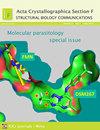空间群C2221中人类SFPQ的二聚化域
IF 0.9
4区 生物学
Acta Crystallographica Section F-structural Biology and Crystallization Communications
Pub Date : 2019-06-01
DOI:10.2210/PDB6NCQ/PDB
引用次数: 1
摘要
剪接因子脯氨酸/谷氨酰胺丰富(SFPQ)是一种重要的rna结合蛋白,参与细胞核功能的许多方面。果蝇行为人剪接蛋白家族的SFPQ及其两个类似蛋白(含非pou结构域的八聚体结合蛋白和副散斑成分1)的结构已经被表征。四个结构域,两个rna识别基序(RRMs),一个被称为NonA/paraspeckle (NOPS)结构域的保守区域和一个c末端卷曲线圈,在相互缠绕的二聚体中提供了一个潜在独特的rna结合表面。然而,二聚体SFPQ中的四个RRMs如何与RNA相互作用的分子细节仍有待研究。本文提出了一种新的人类SFPQ在c中心正交空间群C2221中以一个单体为不对称单元的二聚化域的晶体结构。将新晶体结构与先前报道的SFPQ结构进行比较,并对溶液小角x散射数据进行分析,发现SFPQ在二聚化域中存在微妙的畴运动,支持了SFPQ在溶液中处于平衡态的多种构象的概念。特别是RRM1的结构域移动可能反映了SFPQ的RNA底物的复杂性。综上所述,晶体和溶液结构分析为进一步研究SFPQ在缺乏其同源rna结合伙伴的复合物结构时核酸结合的可塑性提供了分子基础。本文章由计算机程序翻译,如有差异,请以英文原文为准。
The dimerization domain of human SFPQ in space group C2221
Splicing factor proline/glutamine-rich (SFPQ) is an essential RNA-binding protein that is implicated in many aspects of nuclear function. The structures of SFPQ and two paralogs, non-POU domain-containing octamer-binding protein and paraspeckle component 1, from the Drosophila behavior human splicing protein family have previously been characterized. The unusual arrangement of the four domains, two RNA-recognition motifs (RRMs), a conserved region termed the NonA/paraspeckle (NOPS) domain and a C-terminal coiled coil, in the intertwined dimer provides a potentially unique RNA-binding surface. However, the molecular details of how the four RRMs in the dimeric SFPQ interact with RNA remain to be characterized. Here, a new crystal structure of the dimerization domain of human SFPQ in the C-centered orthorhombic space group C2221 with one monomer in the asymmetric unit is presented. Comparison of the new crystal structure with the previously reported structure of SFPQ and analysis of the solution small-angle X-scattering data revealed subtle domain movements in the dimerization domain of SFPQ, supporting the concept of multiple conformations of SFPQ in equilibrium in solution. The domain movement of RRM1, in particular, may reflect the complexity of the RNA substrates of SFPQ. Taken together, the crystal and solution structure analyses provide a molecular basis for further investigation into the plasticity of nucleic acid binding by SFPQ in the absence of the structure in complex with its cognate RNA-binding partners.
求助全文
通过发布文献求助,成功后即可免费获取论文全文。
去求助
来源期刊
自引率
0.00%
发文量
0
审稿时长
2-4 weeks
期刊介绍:
Acta Crystallographica Section F is a rapid structural biology communications journal.
Articles on any aspect of structural biology, including structures determined using high-throughput methods or from iterative studies such as those used in the pharmaceutical industry, are welcomed by the journal.
The journal offers the option of open access, and all communications benefit from unlimited free use of colour illustrations and no page charges. Authors are encouraged to submit multimedia content for publication with their articles.
Acta Cryst. F has a dedicated online tool called publBio that is designed to make the preparation and submission of articles easier for authors.

 求助内容:
求助内容: 应助结果提醒方式:
应助结果提醒方式:


